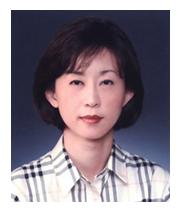people
Professor Lee Ji-hyun of the Graduate School of Culture Technology at KAIST was registered to Marquis Who"s Who, known as one of the world"s three leading biographical dictionaries.
Prof. Lee"s biography was published in the 25th anniversary edition of "Marquis Who"s Who in the World 2008."
Lee"s research interests are the color and culture, computer-supported collaborative design, creative design, evolutionary systems in design, formal models of design process, representation and reasoning in design and visualization for design information.
Lee has published about 30 papers in science journals and for scholastic conferences. She is also a participating professor at KAIST Institute for Entertainment Engineering. Before joining KAIST in 2007, she was an assistant professor at the Department of Digital Media Design and Graduate School of Computational Design, the National Yunlin University of Science & Technology (NYUST) in Taiwan starting from 2002.
She received her Ph.D. from the School of Architecture (Computational Design) at Carnegie Mellon University in 2002. She graduated from the Department of Housing & Interior Design at Yonsei University in Seoul in 1991 and received her M.S. from the same university in 1993.

-
people Top 10 Emerging Technologies by World Economic Forum
The World Economic Forum’s Meta-Council on Emerging Technologies announced its annual list of breakthrough technologies, the “Top 10 Emerging Technologies of 2016,” on June 23, 2016. The Meta-Council chose the top ten technologies based on the technologies’ potential to improve lives, transform industries, and safeguard the planet. The research field of systems metabolic engineering, founded by Distinguished Professor Sang Yup Lee of the Chemical and Biomolecular Engineer
2016-06-27 -
people Two Undergraduate KAIST Students Publish a Book on Health Management
Joonho Suh of the Aerospace Engineering Department and Jiho Suh of the Mechanical Engineering Department are both brothers and undergraduates at KAIST. The Suh brothers, who are three years apart, have recently published a self-help book in English on staying healthy entitled “A Scientific Approach to Building Muscle: Mass Effect.” The book introduces techniques to build muscles, adapting them from an engineering concept called "Active Torque Control (ACT)," the management o
2015-10-26 -
people Seven Graduates of KAIST S+ Convergence AMP Publish a Book, “The First Penguinâ€
Seven graduates of KAIST’s S+ Convergence Advanced Management Program (KAMP) have published a book containing their business success stories, The First Penguin, hoping that in telling their story, they will inspire readers who want to become entrepreneurs. The book is available only in Korean. The title of the book refers to a penguin that enters the water first when other penguins hesitate to dive into the ocean, symbolizing the need to make the first move. The book reflects the experien
2015-05-26 -
people Professor Shim Featured with His Drone System in IEEE Spectrum
The IEEE Spectrum, a technology and science magazine published by the Institute of Electrical and Electronics Engineers (IEEE), featured an article of KAIST’s autonomous unmanned aerial vehicles (UAVs) entitled “South Korea Prepares for Drone vs. Drone Combat,” posted on April 1, 2015. The article introduces the anti-drone defense system being developed by Professor “David” Hyunchul Shim of the Department of Aerospace Engineering at KAIST. With the goal of developi
2015-04-02 -
people Interactions Features KAIST's Human-Computer Interaction Lab
Interactions, a bi-monthly magazine published by the Association for Computing Machinery (ACM), the largest educational and scientific computing society in the world, featured an article introducing Human-Computer Interaction (HCI) Lab at KAIST in the March/April 2015 issue (http://interactions.acm.org/archive/toc/march-april-2015). Established in 2002, the HCI Lab (http://hcil.kaist.ac.kr/) is run by Professor Geehyuk Lee of the Computer Science Department at KAIST. The lab conducts various
2015-03-02